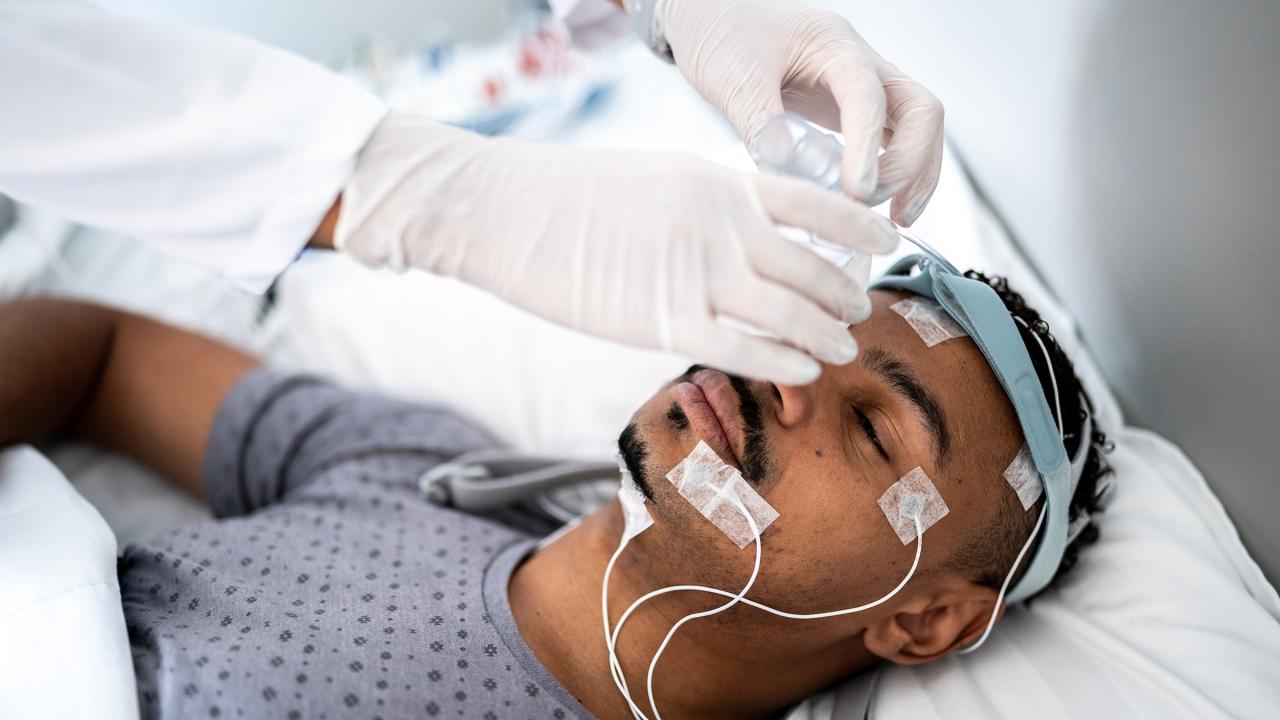
How much does a sleep study cost? It’s a question many people ask when they suspect they might have a sleep disorder. The cost of a sleep study can vary depending on a number of factors, including the type of study, the location of the facility, and your insurance coverage.
Understanding the different types of sleep studies, the factors influencing their cost, and the available financing options can help you make informed decisions about your sleep health.
Understanding Sleep Studies: How Much Does A Sleep Study Cost
Sleep studies, also known as polysomnograms, are diagnostic tests that monitor your sleep patterns and brain activity while you sleep. They are used to identify and diagnose various sleep disorders, such as insomnia, sleep apnea, restless legs syndrome, and narcolepsy.
Types of Sleep Studies
Sleep studies can be categorized into two main types: in-lab and at-home studies.
In-Lab Sleep Studies
In-lab sleep studies are conducted in a specialized sleep laboratory, offering a controlled environment and comprehensive monitoring.
- Polysomnography (PSG): This is the most common type of sleep study, providing a detailed assessment of your sleep patterns. Sensors are attached to your body to monitor various physiological parameters, including brain waves, heart rate, breathing, muscle activity, and eye movements.
- Multiple Sleep Latency Test (MSLT): This test measures how quickly you fall asleep during the day. It is often performed in conjunction with a PSG to diagnose narcolepsy.
- Maintenance of Wakefulness Test (MWT): This test measures your ability to stay awake during the day. It is used to diagnose excessive daytime sleepiness and to evaluate the effectiveness of treatment for sleep disorders.
At-Home Sleep Studies
At-home sleep studies offer a more convenient option for patients who prefer to sleep in their own beds. However, they provide less comprehensive data than in-lab studies.
- Home Sleep Apnea Test (HSAT): This test primarily focuses on monitoring breathing patterns during sleep. It is typically used to screen for obstructive sleep apnea.
- Portable Sleep Study: This test involves wearing a smaller, portable device that monitors basic sleep parameters, such as breathing, heart rate, and movement.
Procedures Involved in Sleep Studies
The procedures involved in a sleep study vary depending on the type of study and the specific parameters being monitored. However, most sleep studies follow a similar general process:
- Initial Consultation: A healthcare professional will conduct a thorough medical history and physical examination to determine the need for a sleep study and to identify any potential risks.
- Preparation: You will be instructed to avoid caffeine, alcohol, and certain medications before the study. You may also be asked to abstain from eating or drinking for a certain period before the study.
- Monitoring: Sensors are attached to your body to monitor various physiological parameters, such as brain waves, heart rate, breathing, muscle activity, and eye movements.
- Sleep: You will be asked to sleep in a comfortable bed or chair in a quiet, darkened room. The duration of the sleep study can vary depending on the type of study and the specific goals.
- Data Analysis: After the sleep study, a healthcare professional will analyze the collected data to identify any sleep disorders or abnormalities.
- Follow-Up: You will receive a detailed report outlining the results of the sleep study and any recommended treatment options.
Cost Factors
The cost of a sleep study can vary significantly depending on several factors. Understanding these factors can help you estimate the potential cost and plan accordingly.
Location and Facility
The location and type of facility where you undergo the sleep study can influence the cost.
- Urban vs. Rural: Sleep studies conducted in urban areas, particularly in major cities, may be more expensive due to higher operating costs and demand.
- Hospital vs. Sleep Center: Hospitals often have higher overhead costs, which may reflect in the price of sleep studies. Sleep centers, specifically designed for sleep studies, may offer more competitive rates.
- Accreditation: Accreditation by organizations like the American Academy of Sleep Medicine (AASM) may indicate a higher standard of care, but could also contribute to higher costs.
Insurance Coverage
Insurance coverage plays a significant role in determining the out-of-pocket expenses for a sleep study.
- Co-pays and Deductibles: Your insurance plan may have co-pays or deductibles that you need to pay upfront. These amounts can vary based on your plan.
- Pre-authorization: Many insurance plans require pre-authorization for sleep studies. This means you need to get approval from your insurance company before the study, which can sometimes delay the process.
- Coverage Limits: Insurance plans may have limits on the number of sleep studies covered per year.
Cost Range

The cost of a sleep study can vary significantly depending on the type of study, the location, and the provider. In general, sleep studies can range from a few hundred dollars to several thousand dollars.
Sleep studies are often covered by health insurance, but there may be co-pays or deductibles. It’s essential to check with your insurance provider to understand your coverage.
Sleep Study Cost Estimates, How much does a sleep study cost
The following table provides estimates for the cost of common sleep studies. Keep in mind that these are just estimates, and actual costs may vary.
| Study Type | Average Cost | Potential Cost Variations |
|---|---|---|
| Polysomnography (PSG) | $1,500 – $3,000 | May be higher if done in a hospital setting or if additional testing is required. |
| Home Sleep Study (HST) | $200 – $800 | May be lower if the study is ordered by a doctor. |
| Multiple Sleep Latency Test (MSLT) | $500 – $1,000 | May be higher if done in a hospital setting. |
| Maintenance of Wakefulness Test (MWT) | $300 – $700 | May be higher if done in a hospital setting. |
Financing Options

The cost of a sleep study can vary depending on the type of study, the location, and the provider. However, there are several financing options available to help make sleep studies more affordable. These options can help offset the cost of a sleep study, making it more accessible to those who need it.
Payment Plans
Many sleep centers and clinics offer payment plans to help patients spread out the cost of their sleep study. These plans typically involve making monthly payments over a set period, such as six or twelve months. This can make the overall cost more manageable for patients.
Healthcare Financing
Healthcare financing options, such as medical loans or credit cards, can also be used to pay for sleep studies. These options can provide patients with the necessary funds to cover the cost of the study upfront, and they often come with interest rates that are lower than those offered by traditional credit cards.
Insurance Coverage
Most health insurance plans cover at least some of the cost of sleep studies, especially if they are medically necessary. To determine if your insurance plan covers sleep studies, you can contact your insurance provider directly. It is important to check your insurance coverage before scheduling a sleep study, as this can help you understand your out-of-pocket costs.
When checking your insurance coverage, be sure to ask the following questions:
- Does my insurance plan cover sleep studies?
- What is the coverage amount for sleep studies?
- What is my deductible for sleep studies?
- Are there any pre-authorization requirements for sleep studies?
The answers to these questions will help you understand your financial responsibility for a sleep study and can help you plan accordingly.
Tips for Saving Money

Getting a sleep study can be expensive, but there are ways to potentially reduce the cost. Understanding the factors that influence the price and exploring available options can help you save money. This section will provide tips for finding affordable sleep study providers and negotiating prices, along with insights on seeking financial assistance.
Finding Affordable Sleep Study Providers
Finding an affordable sleep study provider can be challenging. The cost of a sleep study can vary significantly depending on the location, the type of study, and the provider. However, there are several ways to find providers who offer competitive prices.
- Check with your insurance provider: Your insurance provider may have a network of preferred providers who offer discounted rates. They can also help you determine what services are covered by your plan.
- Compare prices from multiple providers: Get quotes from different providers in your area and compare their prices and services. Be sure to ask about any additional fees or charges.
- Consider using a telehealth platform: Some telehealth platforms offer virtual sleep studies that can be more affordable than in-person studies. These platforms can also help you find providers who offer competitive prices.
- Look for discounts or promotions: Some providers offer discounts for seniors, students, or patients who pay cash. You can also check for promotions or special offers.
- Ask about payment plans: Some providers offer payment plans or financing options that can make the cost of a sleep study more manageable.
Negotiating Prices
Negotiating prices for medical services can be difficult, but it is worth trying. If you are paying for a sleep study out of pocket, you can try to negotiate a lower price.
- Be polite and respectful: When you call or email the provider, be polite and respectful. Explain that you are looking for the best possible price for the services you need.
- Explain your situation: Explain your financial situation and how you are trying to find the most affordable option. If you have a limited budget, be upfront about it.
- Be prepared to walk away: If the provider is unwilling to negotiate, be prepared to walk away and find another provider. There are often other options available.
Seeking Financial Assistance
If you are unable to afford a sleep study, there are several options for financial assistance.
- Check with your employer: Some employers offer health savings accounts (HSAs) or flexible spending accounts (FSAs) that can be used to pay for medical expenses.
- Apply for a grant or scholarship: Several organizations offer grants or scholarships to help people with medical expenses. You can search for these organizations online or ask your doctor for recommendations.
- Look for low-cost or free clinics: Some community health centers offer low-cost or free sleep studies. You can find these clinics by searching online or contacting your local health department.
Final Summary
Getting a sleep study can be a significant investment, but it’s an investment in your health and well-being. By understanding the costs, exploring financing options, and seeking affordable providers, you can take control of your sleep health and improve your quality of life.
FAQ Summary
What are the most common types of sleep studies?
The most common types of sleep studies are polysomnography (PSG) and home sleep studies. A PSG is a comprehensive study conducted in a sleep lab, while a home sleep study can be done in the comfort of your own home.
Is a sleep study covered by insurance?
Many insurance plans cover sleep studies, but coverage can vary depending on your plan and the specific type of study. It’s important to check with your insurance provider to determine your coverage and out-of-pocket costs.
What are some tips for finding affordable sleep study providers?
You can find affordable sleep study providers by comparing prices from different facilities, checking for discounts or payment plans, and seeking financial assistance from organizations like the National Sleep Foundation.





